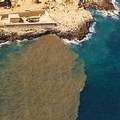 據聯合國環境規劃署(UNEP)一份新報告顯示,農業廢棄物污水與垃圾,造成世界海洋環境污染不斷擴大。聯合國於4日所公布的報告中表示,海洋污染持續的惡化,不僅對健康、經濟以及環境等帶來嚴重的負面影響,往後的環境恢復進程也變得更加棘手。
據聯合國環境規劃署(UNEP)一份新報告顯示,農業廢棄物污水與垃圾,造成世界海洋環境污染不斷擴大。聯合國於4日所公布的報告中表示,海洋污染持續的惡化,不僅對健康、經濟以及環境等帶來嚴重的負面影響,往後的環境恢復進程也變得更加棘手。
聯合國環境規劃署執行長史坦納(Achim Steiner)表示,「據估計,80%的海洋污染來自於陸地,如果沿岸人口在40年內加倍成長,而對抗污染的行動未能加速的話,預期在2050年,海洋污染會大幅上升。」
聯合國環境規劃署的海洋環境狀況報告並關注沿海生態系的損害及破壞的增加。包括紅樹林、珊瑚礁和海床的沿海生態系在實質上與經濟上,皆極具重要性。
這份報告由聯合國環境規劃署的保護海洋環境全球行動計畫(GPA)所負責。最後結果會提供超過60個國家的政府,這些政府將參加10月16-20日在中國北京所舉行GPA 10年回顧會議。
研究報告顯示海洋環境最嚴重的問題是污水排放,有一部分原因是各國處理污水的進度緩慢。報告指出,在許多開發中國家,有超過80%的廢水未經處理或僅有初步處理,即排放至沿岸地區。
報告指出,沿岸人口的增加,缺乏下水道等基礎建設以及廢棄物處理設施,都造成污水的問題。聯合國環境規劃署警告,要解決全球的污水問題,至少要花5600億美元。
污水問題曾經主要是已開發國家最大的問題,不過現在問題已經擴及開發中國家。報告指出,海洋廢棄物多為生物不可分解的,儘管各國國內和國際間監控海洋廢棄物的努力已在進行,但是問題「仍持續惡化中」。
不過,在報告中仍有些好消息,報告指出,輻射性廢棄物及石油和化學污染已然減少。自1980年代中期以來,海洋的石油污染大幅減少60%以上,其他的進展包括重金屬的監控,以及沉積物的移除。
The world's marine environment is increasingly polluted with sewage and agricultural waste and littered with trash, according to a new report by the United Nations Environment Program. The report, released today, finds that this rising pollution is having serious adverse health, economic and environmental impacts and warns that reversing course will be difficult.
"An estimated 80 per cent of marine pollution originates from the land and this could rise significantly by 2050 if, as expected, coastal populations double in just over 40 years time and action to combat pollution is not accelerated," said UNEP Executive Director Achim Steiner.
UNEP's State of the Marine Environment report also notes rising concern over the increasing damage and destruction of essential and economically important coastal ecosystems, including mangrove forests, coral reefs and seagrass beds.
The report has been compiled by UNEP's global program of action (GPA) for protection of the marine environment. The findings will be given to more than 60 national governments attending an intergovernmental review of the 10 year-old GPA initiative in Beijing, China, from October 16-20.
The study reports that sewage may be "the most serious problem" facing the marine environment, in part because it is the area where the least progress has been made. In many developing countries more than 80 percent of sewage entering the coastal zones is estimated to be raw and untreated, the report said.
Increasing coastal populations, inadequate treatment infrastructure and waste handling facilities are all contributing to the sewage problem, the report said. Fixing the global sewage problem could cost at least $56 billion, UNEP warned.
The problem was once largely confined to developed countries but is now spreading to developing ones, the report said. National and international efforts to control marine litter - much of which is not biodegradable - have been implemented, the report said, but the problem "has steadily grown worse."
There is some good news in the report, which cites progress on cutting radioactive waste dumping as well as oil and chemical pollution. The amount of oil entering the marine environment has fallen more than 60 percent since the mid-1980s, the report said. Progress is mixed on controlling heavy metals, the report said, and sediment mobilization.


